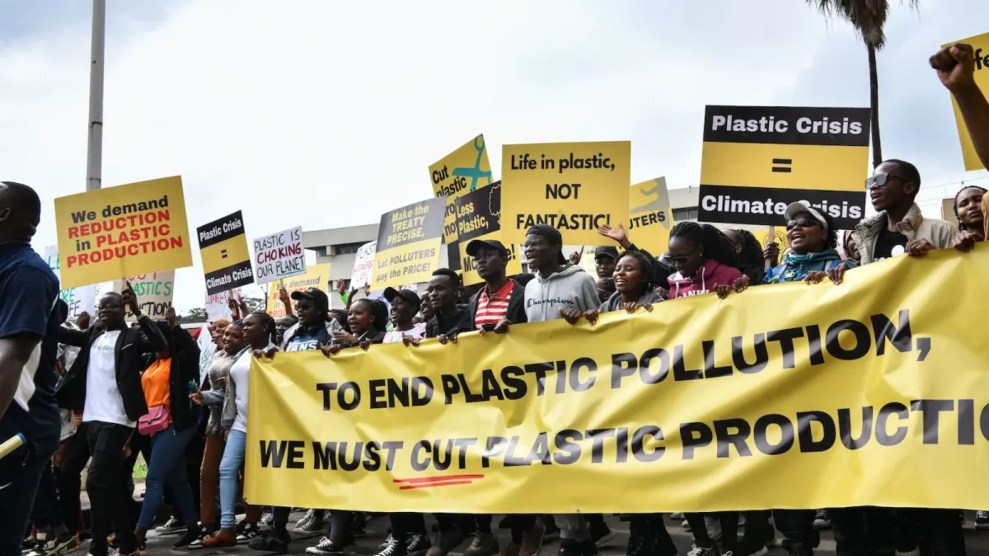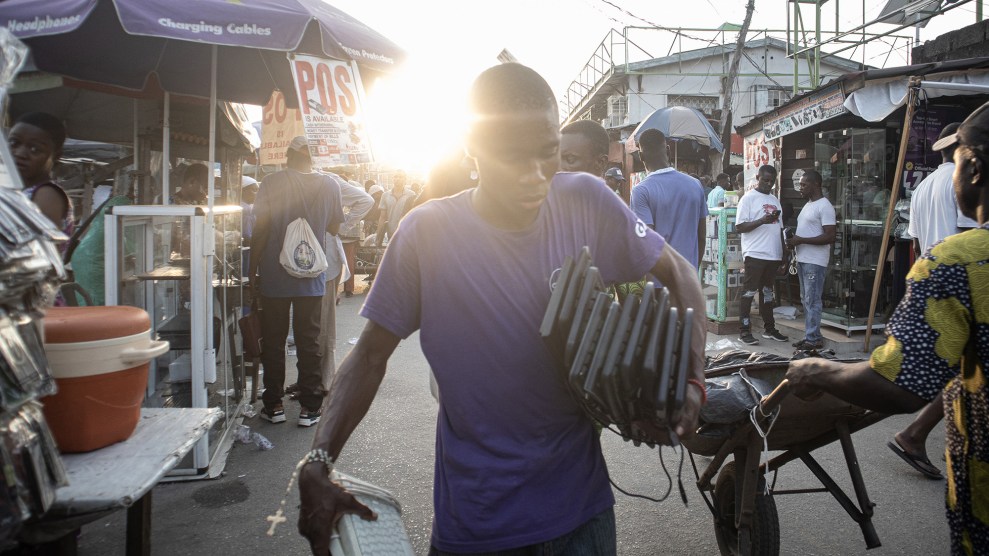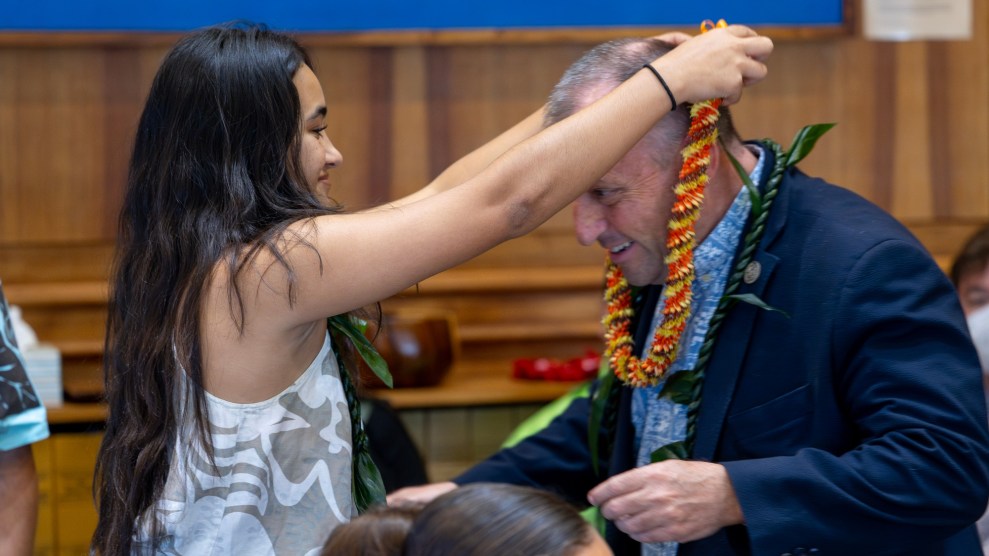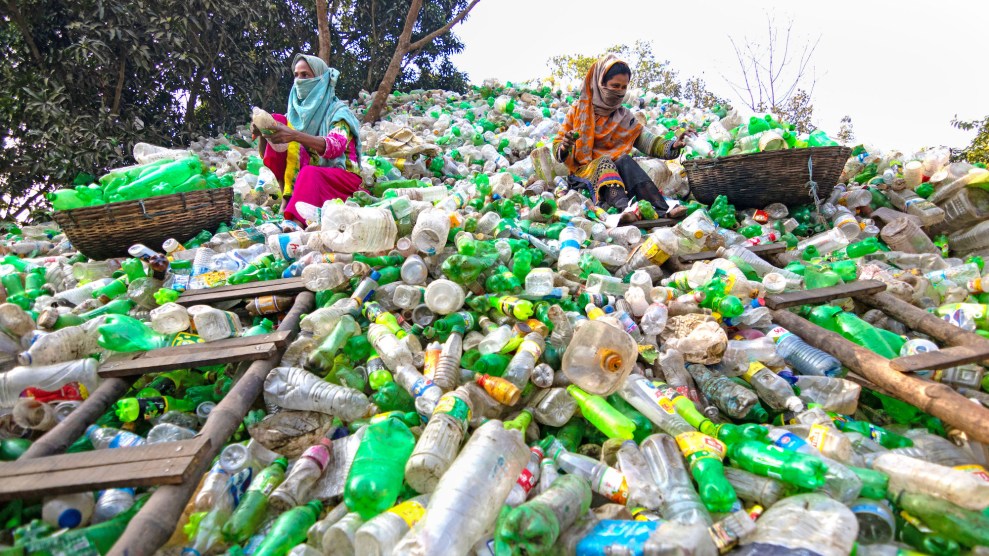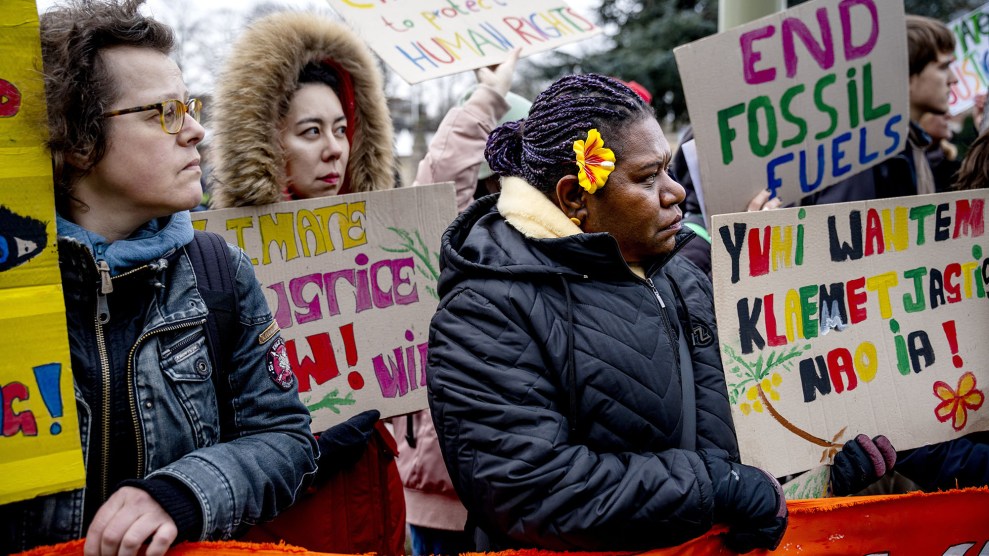
ANP/Zuma
This story was originally published by Grist and is reproduced here as part of the Climate Desk collaboration.
The world’s biggest climate case begins at The Hague in the Netherlands today. Oral arguments will be heard by the International Court of Justice (ICJ), which will consider what obligations United Nations member states have under international law to protect the planet from greenhouse gas emissions for future generations.
The case begins less than two weeks after negotiations collapsed at the UN’s annual international climate conference, COP29, in Azerbaijan, resulting in a climate finance agreement that’s been widely criticized as inadequate. It also marks the end of the hottest year on record, punctuated by numerous extreme weather events including deadly floods and hurricanes driven by climate change.
“The stakes are not high, they’re devastatingly high,” said Julian Aguon, an attorney representing Vanuatu, the Pacific country leading the case. “It’s an opportunity to finally bring the promise of climate justice closer within reach.”
The ICJ was established after World War II as a judicial mechanism for mitigating conflicts between United Nations member states and continues to arbitrate disputes issuing advisory opinions interpreting and clarifying international law. Such opinions are non-binding, but are still meaningful because they clarify binding law, such as the meaning of international treaties including the 2015 Paris Agreement that sought to cap the severity of global warming. In 1994, a judgment from the court on war between Libya and Chad over disputed territory prompted Libya to withdraw from Chad, and helped lead to a peace agreement.
“We have the opportunity to leave behind a more capable international legal regime than we inherited.”
But the court’s rulings are not always effective. Earlier this year, the ICJ ruled that Israel should end its occupation of the Palestinian territories immediately and make reparations to affected peoples. The occupation has continued, illustrating the limits of the ICJ’s power. In addition, big polluters like China and the US have rejected the court’s compulsory jurisdiction, and so a ruling may apply to them more narrowly.
The court will now decide what if any legal consequences such countries should face for contributing to climate change, both from what they’ve done and what they haven’t done. That could include affirming that big polluters have a legal obligation to pay reparations.
The campaign to bring the case to the ICJ was initiated in 2019 by 27 law students at the University of the South Pacific in Fiji. It has now grown to be the largest case in the 77-year history of the ICJ and will consist of oral arguments from 98 countries and 12 international nongovernmental organizations.
In order to get on the ICJ’s docket, the students who began the case first had to convince Vanuatu’s government to back their campaign for an advisory opinion, then get other Pacific states on board by bringing the issue before the Pacific Forum, the premier diplomatic body in the Oceanic region.
The pandemic in 2020 interrupted their campaign, preventing the youth from traveling to United Nations’ climate conferences to advocate for their agenda. But the group moved online and managed to drum up support from Pacific island states, Caribbean nations, countries in Africa and Latin America, and dozens more. Slowly the group built enough diplomatic support to get on the agenda at the UN General Assembly, and later, built such a widespread backing that the Assembly approved the resolution calling for an ICJ advisory opinion on climate change by consensus.
“How the law is shaped from here on depends on this moment, depends on the ICJ,” said Vidal Prashad, one of the student campaigners based in Fiji. “We have the opportunity to leave behind a more capable international legal regime than we inherited.”
Ahead of this week’s oral arguments, young people have continued their campaigning, helping to collect witness testimonies from Indigenous Pacific peoples on how they’re currently being harmed by rising seas and climate change-fueled extreme weather events. They are also helping the governments who plan to present at the ICJ to craft their arguments and ensure they put forth the strongest, most progressive case. Prashad flew from Fiji to The Hague, where the youth’s five-year grassroots effort is finally reaching its conclusion.
“It will have moral weight…We are doing this for the benefit of the global community.”
Joie Chowdhury, a senior attorney at the Center for International Environmental Law, which has provided legal support for the case, said a favorable ruling from ICJ would help climate activists hold polluting countries accountable. Youth activists could cite the ruling in future climate litigation against their governments. Politicians could use the ICJ’s opinion to push for sanctions against countries who fail to comply, and diplomats could point to the document as a minimum standard in next year’s global climate change negotiations. “Failure to comply with legal consequences in the face of such devastating climate harm, that’s not just being in contravention of the law, it’s unconscionable,” Chowdhury said.
She noted that a lot of countries talk big about climate action, but this week’s oral arguments could illuminate what big polluters really think about the idea of being legally liable for their greenhouse gas emissions, something that could provide more clarity on what the barriers to climate action are. And even if it’s not in large countries’ interest to put up money for climate reparations, it is in their interest to appear to respect the treaties that they’ve already agreed to, which the ICJ ruling could help clarify.
“Climate justice is about accountability,” Chowdhury said. “Climate harm has been done, there was knowledge about this, and there must be redress for frontline communities. And for this court to really clarify that there is a right to remedy and reparation for climate harm, that is really important.”
“It will have moral weight,” said Arnold Kiel Loughman, the attorney general of Vanuatu, who plans to address the court. “We are doing this for the benefit of the global community.”
Climate change witness testimonials from across the Pacific underscore the cost of doing nothing. One village in Papua New Guinea has been forced to move four times due to sea level rise, and is in the midst of its fifth and final relocation. “I say final, because there are simply no more inland (places) to go,” Aguon said.
Such climate impacts have been existential for Indigenous Pacific peoples whose cultures are intimately connected to the food they grow, the waters they fish, and the lands they call home.
“We have so much to lose,” said Prashad from the University of the South Pacific. “Whole countries are standing to lose their whole identities.”
